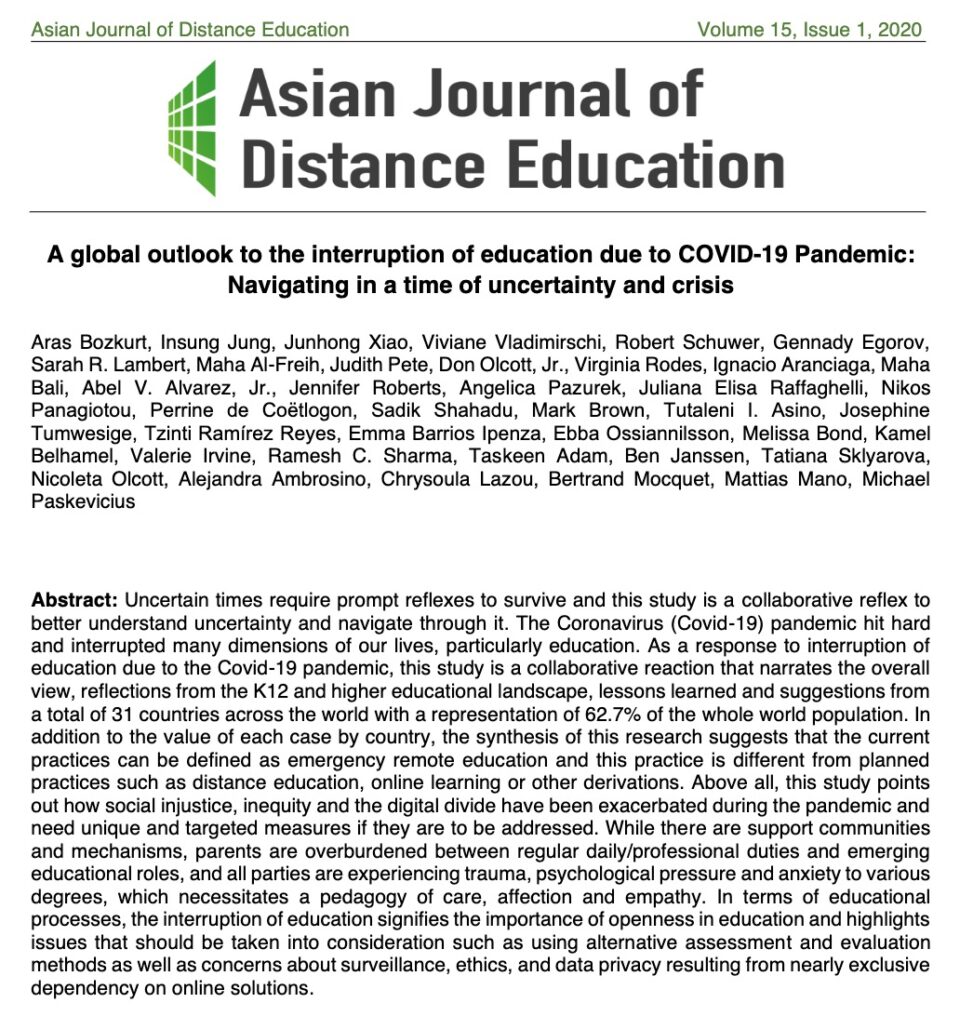More than 30 education experts from around the world contributed to this article that provides a comprehensive overview of the education’s global response to the pandemic, drawing from the experiences in 31 countries that represent almost two thirds of the world’s population.
This paper was published June 6, 2020 in the Asian Journal of Distance Education and is available openly under a Creative Commons CC BY-SA license. From the abstract:
Uncertain times require prompt reflexes to survive and this study is a collaborative reflex to better understand uncertainty and navigate through it. The Coronavirus (Covid-19) pandemic hit hard and interrupted many dimensions of our lives, particularly education. As a response to interruption of education due to the Covid-19 pandemic, this study is a collaborative reaction that narrates the overall view, reflections from the K-12 and higher educational landscape, lessons learned and suggestions from a total of 31 countries across the world with a representation of 62,7% of the whole world population. In addition to the value of each case by country, the synthesis of this research suggests that the current practices can be defined as emergency remote education and this practice is different from planned practices such as distance education, online learning or other derivations. Above all, this study points out how social injustice, inequity and the digital divide have been exacerbated during the pandemic and need unique and targeted measures if they are to be addressed. While there are support communities and mechanisms, parents are overburdened between regular daily/professional duties and emerging educational roles, and all parties are experiencing trauma, psychological pressure and anxiety to various degrees, which necessitates a pedagogy of care, affection and empathy. In terms of educational processes, the interruption of education signifies the importance of openness in education and highlights issues that should be taken into consideration such as using alternative assessment and evaluation methods as well as concerns about surveillance, ethics, and data privacy resulting from nearly exclusive dependency on online solutions.
Citation:
Bozkurt, A., Jung, I., Xiao, J., Vladimirschi, V., Schuwer, R., Egorov, G., Lambert, S., Al-Freih, M., Pete, J., Olcott, Jr., D., Rodes, V., Aranciaga, I., Bali, M., Alvarez, A. J., Roberts, J., Pazurek, A., Raffaghelli, J. E., Panagiotou, N., de Coëtlogon, P., Shahadu, S., Brown, M., Asino, T. I., Tumwesige, J., Ramírez Reyes, T., Barrios Ipenza, E., Ossiannilsson, E., Bond, M., Belhamel, K., Irvine, V., Sharma, R. C., Adam, T., Janssen, B., Sklyarova, T., Olcott, N., Ambrosino, A., Lazou, C., Mocquet, B., Mano, M., & Paskevicius, M. (2020). A global outlook to the interruption of education due to COVID-19 pandemic: Navigating in a time of uncertainty and crisis. Asian Journal of Distance Education, 15(1), 1-126. Retrieved from http://asianjde.org/ojs/index.php/AsianJDE/article/view/462

Luis Olvera
"Gracias por su interés. Abriremos posiblemente en abril un nuevo curso. Si gusta, nos ..."
Patricia Varela
"Me interesa....como me inscribo?...algún link de información para tomar este curso? "
Luis Olvera
"Muchas gracias por sus comentarios. Sin duda, todos los esfuerzos en bien de la ..."
José Benito García Carmona
"Muy interesante curso, muy oportuno ante la realidad y la situación que el ..."
Alan Levine
"Bedankt, Jasper! Thanks for sharing your story. Now you are in the queue ..."
Alan
"Thanks for this one, Tanya. The image reminds me a bit of the ..."
Nancy
"What an amazing idea! Love it! "
Alan Levine
"Thanks Stephen, it occurs to me I need to frame what "extraordinary" means--to ..."
Terry Greene
"I want to come! This is awesome. "
Ken Bauer
"This is super cool. Thanks for sharing Terry! "
Portia Tinnermon
"Richard and the rest of our faculty are doing an incredible job ..."